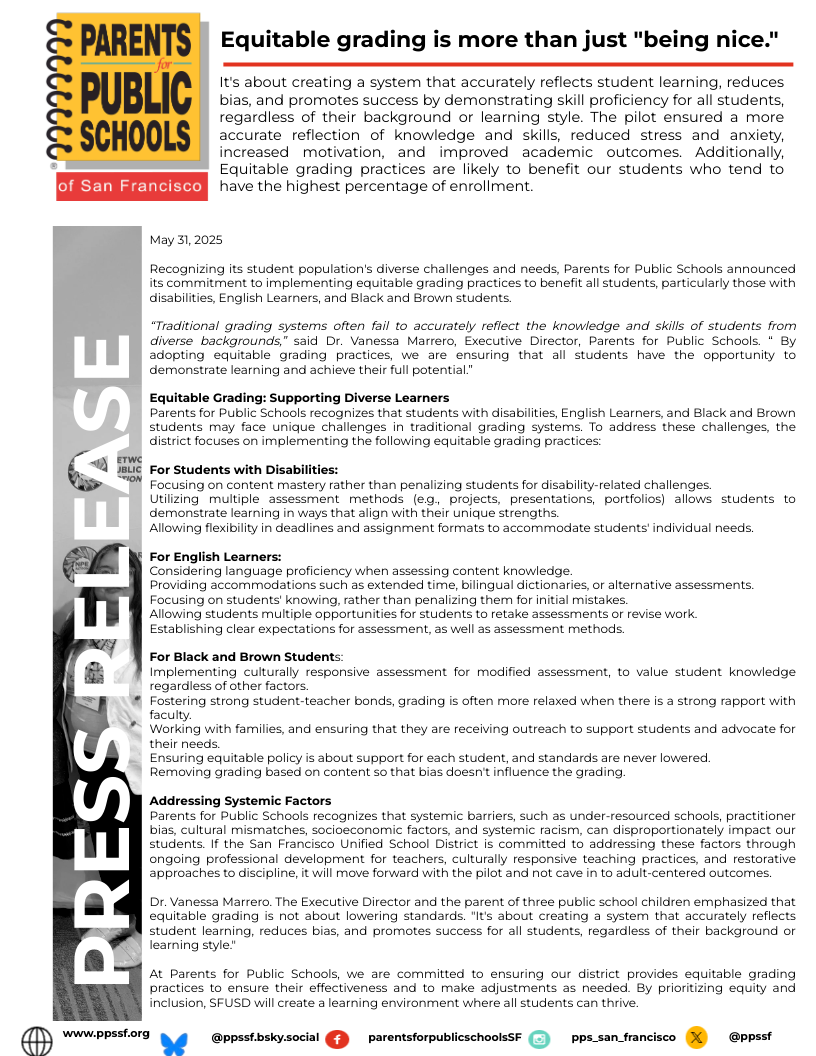Equitable grading is more than just "being nice."
It's about creating a system that accurately reflects student learning, reduces bias, and promotes success by demonstrating skill proficiency for all students, regardless of their background or learning style. The pilot ensured a more accurate reflection of knowledge and skills, reduced stress and anxiety, increased motivation, and improved academic outcomes. Additionally, equitable grading practices are likely to benefit our students who tend to have the highest percentage of enrollment.
May 31, 2025
Recognizing its student population's diverse challenges and needs, Parents for Public Schools announced its commitment to implementing equitable grading practices to benefit all students, particularly those with disabilities, English Learners, and Black and Brown students.
“Traditional grading systems often fail to accurately reflect the knowledge and skills of students from diverse backgrounds,” said Dr. Vanessa Marrero, Executive Director, Parents for Public Schools. “ By adopting equitable grading practices, we are ensuring that all students have the opportunity to demonstrate learning and achieve their full potential.”
Equitable Grading: Supporting Diverse Learners
Parents for Public Schools recognizes that students with disabilities, English Learners, and Black and Brown students may face unique challenges in traditional grading systems. To address these challenges, the district focuses on implementing the following equitable grading practices:
For Students with Disabilities:
Focusing on content mastery rather than penalizing students for disability-related challenges.
Utilizing multiple assessment methods (e.g., projects, presentations, portfolios) allows students to demonstrate learning in ways that align with their unique strengths.
Allowing flexibility in deadlines and assignment formats to accommodate students' individual needs.
For English Learners:
Considering language proficiency when assessing content knowledge.
Providing accommodations such as extended time, bilingual dictionaries, or alternative assessments.
Focusing on students' knowing, rather than penalizing them for initial mistakes.
Allowing students multiple opportunities for students to retake assessments or revise work.
Establishing clear expectations for assessment, as well as assessment methods.
For Black and Brown Students:
Implementing culturally responsive assessment for modified assessment, to value student knowledge regardless of other factors.
Fostering strong student-teacher bonds, grading is often more relaxed when there is a strong rapport with faculty.
Working with families, and ensuring that they are receiving outreach to support students and advocate for their needs.
Ensuring equitable policy is about support for each student, and standards are never lowered.
Removing grading based on content so that bias doesn't influence the grading.
Addressing Systemic Factors
Parents for Public Schools recognizes that systemic barriers, such as under-resourced schools, practitioner bias, cultural mismatches, socioeconomic factors, and systemic racism, can disproportionately impact our students. If the San Francisco Unified School District is committed to addressing these factors through ongoing professional development for teachers, culturally responsive teaching practices, and restorative approaches to discipline, it will move forward with the pilot and not cave in to adult-centered outcomes.
Dr. Vanessa Marrero. The Executive Director and the parent of three public school children emphasized that equitable grading is not about lowering standards. "It's about creating a system that accurately reflects student learning, reduces bias, and promotes success for all students, regardless of their background or learning style."
At Parents for Public Schools, we are committed to ensuring our district provides equitable grading practices to ensure their effectiveness and to make adjustments as needed. By prioritizing equity and inclusion, SFUSD will create a learning environment where all students can thrive.

